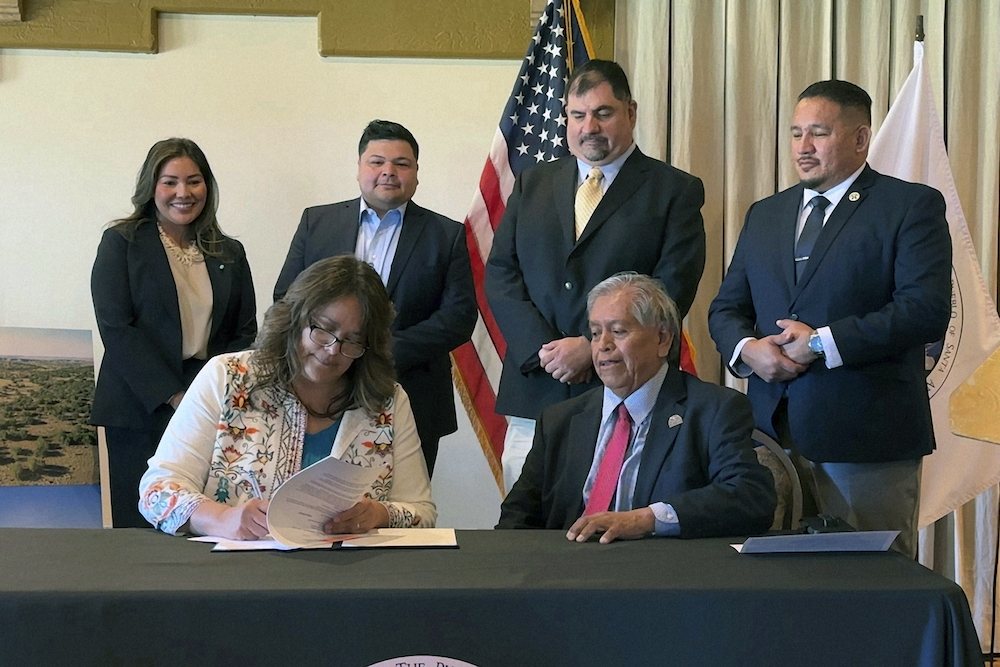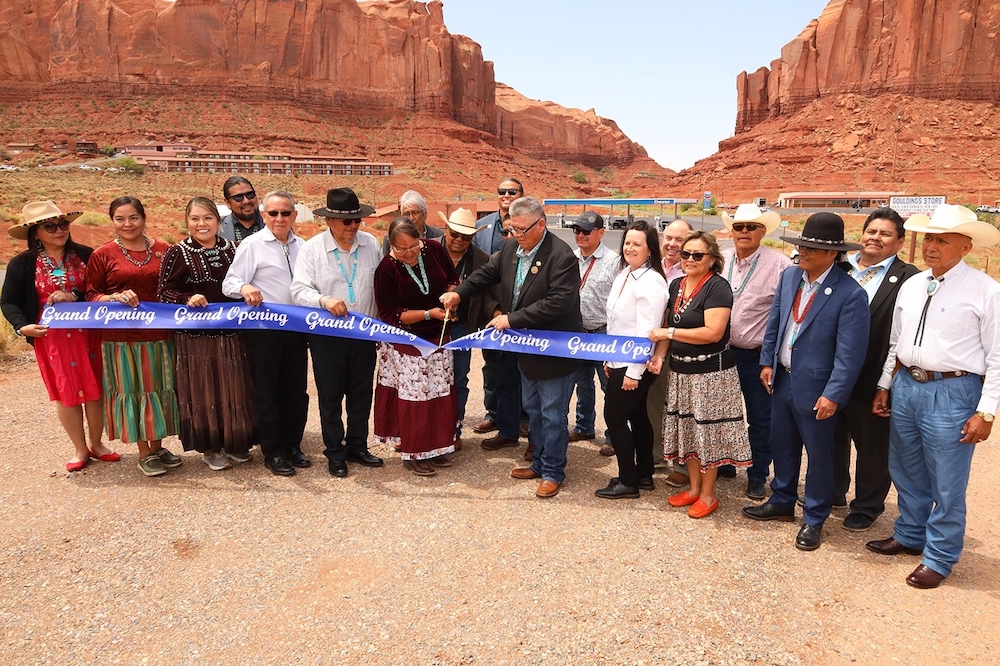
- Details
- By Chez Oxendine
- Real Estate
This month's tribal land roundup features significant land deals and trust news, including the Shasta Tribe reclaiming ancestral land and a federal court decision on land-into-trust acquisitions in Alaska.
Plus, we’ve got landback news from the Keweenaw Bay Indian Community of the Lake Superior Band of Chippewa Indians and the Colville Confederated Tribes, as well as a report on the Pueblo of Isleta's historic partnership to preserve Pottery Mound, and much more.
Shasta Tribe Reclaims Ancestral Land After Over a Century
The state of California is working with the Shasta Indian Nation to transfer 2,280 acres in Siskiyou County back to the tribe, establishing the tribe’s first land base in over a century per the Arizona Republic, which first reported the news.
The property was, until recently, contained within the Copco 1 reservoir, which is part of the series of Klamath River hydroelectric systems known as the Lower Klamath Project. The dam was drained earlier this year, leaving the land open to serve as the eventual “heart” of the Shasta Tribe, council member Michael Olson told Jefferson Public Radio.
“It’s the center of the Shasta world,” Olson said. “This is the culmination of over 16 years of consistent pressing forward and struggle to get to this point. It’s a very amazing time for us.”
Details around the land transfer’s timing and further public access to the Klamath River in the surrounding area have not yet been released. The tribe plans to create a public trail and cultural center, and begin growing food, medicine, and ceremonial materials on the land.
“We will be working to make sure food plants are reintroduced to areas where they haven’t been for over 100 years,” Olson told JPR. “The return of the land is amazing, but I’m also looking forward to us being able to return to it.”
Court Decision Brings Mixed Outcomes for Alaska Trust Lands
A federal court decision in Alaska has paved the way for new tribal trust lands in the state. The same decision, however, may have stifled tribal ambitions to establish reservations there.
In May this year, the United States District Court of Alaska heard The State of Alaska v. Newland, et. al., in which the Department of the Interior argued in favor of taking land in Juneau into trust for the benefit of the Tlingit and Haida Tribe.
The State argued that, while the Indian Reorganization Act of 1934 had given the Interior the right to establish Indian reservations, the Alaska Native Claims Settlement Act of 1971 extinguished the claims to all but one of those reservations. The court found that ANCSA did not preclude the Interior from taking land into trust, but also found the reasoning for putting Tlingit and Haida’s fee land into trust “arbitrary.”
“To 'restore' means 'to give back…' or 'to return something.' Such a definition necessarily implies that an item given back or returned to someone rightly belongs to that person; i.e., that the person holds title to that item,” reads the court opinion. “As the State points out, however, ANCSA extinguished “[a]ll aboriginal titles... and claims of aboriginal title in Alaska based on use and occupancy.”
The court’s ruling vacates a prior ruling by the U.S. District Court of Washington D.C. Court of Appeals, which in turn upended the original ruling in favor of Alaska tribes’ rights to put land into trust. The case has been remanded for further proceedings.
Trust Land
On June 12, the Santa Ana Pueblo signed the last documents necessary to bring more than 60,000 acres into federal trust, per the Associated Press. The acreage, formerly known as the Alamo Ranch, was purchased for an undisclosed sum in 2016 from the family of former New Mexico governor Bruce King. (The Associated Press reports the stated market price for the land was $33 million.) The Pueblo refer to the land as Tamaya Kwii Kee Nee Puu, and since 2016 restorative efforts have brought back wildlife and plant life to the area. Bringing the land into trust has effectively doubled the size of the Pueblo’s reservation lands.
Land Back
In Michigan, conservation nonprofit the Nature Conservancy transferred 760 acres of forest land in Baraga County to the Keweenaw Bay Indian Community of the Lake Superior Band of Chippewa Indians in mid-June. Our sister publication, Native News Online, reports the Conservancy purchased the land from a private owner in 2021. In a news release, Evelyn Ravindran, Keweenaw Bay Natural Resources Director, emphasized the importance of collaborating with partners to achieve shared goals beyond artificial boundaries. She noted that The Nature Conservancy (TNC) has valued the Keweenaw Bay Indian Community's input in the Keweenaw Heartlands Project and is interested in further partnerships, such as wildlife monitoring and wild rice restoration.
In Cashmere, Wash., the Colville Confederated Tribes have acquired 11.08 acres of land bordering the Wenatchee River. Details of the transaction were not disclosed, per reporting by Washington publication Source One News. The tribe has not yet announced a specific use for the land, but note that the land is part of the ancestral home of the Wenatchi, one of the confederated tribes. Colville Chairman Jarred-Michael Erickson told Source One the tribes were excited to restore ancestral lands to their former owners. “We hope that the Wenatchi will enjoy this land for many generations to come, and we will continue to restore all of our confederated tribes to their homelands,” Erickson said.
 Members of the Navajo Nation Hospitality Enterprise Board, 25th Navajo Nation Council, Navajo Nation President Dr. Buu Nygren, and the Navajo Land Department stood together at the grand opening of the Goulding's Lodge. (Courtesy photo)
Members of the Navajo Nation Hospitality Enterprise Board, 25th Navajo Nation Council, Navajo Nation President Dr. Buu Nygren, and the Navajo Land Department stood together at the grand opening of the Goulding's Lodge. (Courtesy photo)
Real Estate Deals
The Navajo Nation completed the acquisition of Goulding’s Monument Valley Lodge and Tours June 14, reports the San Juan Record. The Navajo Nation Council approved the $59.5 million purchase of the business, including 670 acres of land, in October 2023. The property includes the lodge, an RV campground, rental cabins, a grocery store, convenience store, and airstrip. Management of the lodge and its accompanying tour business has been transferred over to the Navajo Nation Hospitality Enterprise. The Enterprise will keep more than 300 employees already working at the lodge.
In Marquette, Mich., the Sault Ste. Marie Tribe of Chippewa Indians purchased two buildings in the city as a way to provide space for gatherings and services. The local Marquette Mining Journal reports the tribe purchased a 16,000-square-foot former U.S. Army Reserve building, as well as a former clinic called the Southgate Center. The former Reserve building will be used as a community space and eventually a commercial kitchen, while Southgate Center will be remodeled and turned into a space for health services, per the Mining Journal report.
Noteworthy
The Biden administration has taken the final step to reject the proposed 211-mile industrial road through the Brooks Range foothills, a project intended to enable commercial mining in a remote Arctic area in Northwest Alaska. On Friday, the U.S. Bureau of Land Management (BLM) issued a formal document denying the right-of-way permit for the Ambler Access Project, which follows an initial announcement in April, per reporting by the Alaska Beacon. This road, considered vital for economic mining feasibility in the metals-rich Ambler mining district, was supported by the Alaska Industrial Development and Export Authority and mining companies Trilogy Metals Inc. and South32. The BLM's decision, detailed in a record of decision, highlights concerns over significant negative impacts, such as wildlife habitat fragmentation, fish habitat degradation, pollution, permafrost thaw, and cultural disruptions, which would adversely affect Indigenous communities.
Despite a tight budget, the U.S. House Transportation, Housing and Urban Development Appropriations Subcommittee proposed a 9% increase for the Indian Housing Block Grant program, a key source of funding for tribal housing needs. This would allocate $1.22 billion to the program, $110 million more than the previous year. While advocating for continued pressure on Congress, tribal housing leaders see this as a positive step towards securing essential funding for safe and quality housing in tribal communities.
The Swinomish Indian Tribal Community in Washington won a $400 million judgment after a federal judge ruled the BNSF Railway trespassed on reservation lands. We reported on the incident in mid-June, when U.S. District Judge Robert Lasnik ruled that BNSF violated a 1991 easement agreement by repeatedly running crude oil trains through the Swinomish reservation. The tribe sued the rail operator in 2015, alleging that BNSF grew their operation from one 25-car train to more trains with more cars, past the bounds of the easement. On June 17, a bench trial concluded in the tribe’s favor.
The Pueblo of Isleta and the U.S. Army Corps of Engineers-Albuquerque District have entered a “historic” partnership to initiate a cultural preservation study for the Pottery Mound site, according to a news release. The agreement, signed on June 26, 2024, by Lt. Col. Jerre Hansbrough and Pueblo of Isleta Gov. Max Zuni, marks the first step in addressing the severe erosion threatening this significant cultural resource. Updated guidelines in USACE’s Tribal Consultation Policy now allow for cultural resource protection work under the Tribal Partnership Program, making this study a pioneering effort. The study, set to begin in fall 2024, aims to find solutions to protect the Pottery Mound from further erosion and water damage, with an initial $200,000 federally funded and a 50:50 cost-share agreement thereafter.
Associate Editor Brian Edwards contributed reporting on this month's roundup. If you have news or information about landback acquisitions or deals involving tribal land, shoot me a note at [email protected].
